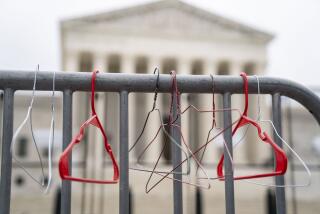Obama appointments could trigger court test case
Reporting from Washington — President Obama’s decision to defy Senate Republicans and appoint four top agency officials on his own authority sets the stage for a contentious constitutional battle over the powers of the presidency and the role of Congress.
To Republicans, Obama’s action amounted to “an extraordinary and entirely unprecedented power grab,” according to House Speaker John A. Boehner of Ohio, who said the move would have “a devastating effect on the checks and balances” in the Constitution.
To Democrats, who have the majority in the Senate, the blame rested on an obstructionist GOP minority, which has been stalling appointments, said Senate Majority Leader Harry Reid of Nevada.
Reid criticized the Republicans for blocking an up-or-down vote on nominees such as former Ohio Atty. Gen. Richard Cordray, Obama’s pick for head of the newly created Consumer Financial Protection Bureau. Cordray, nominated last summer, had 53 votes for confirmation, short of the 60 needed to overcome a GOP filibuster.
In addition to appointing Cordray, Obama on Wednesday named three officials to fill vacancies on the National Labor Relations Board, which referees labor-management disputes. He made the appointments — two Democrats and a Republican — under his power to fill vacancies during a congressional recess. He argued that the Senate was in recess despite pro forma sessions designed by the GOP to forestall recess appointments.
Underscoring the fact that the appointments will be an election year issue, Republican presidential front-runner Mitt Romney on Thursday called Obama a “crony capitalist” who had put “union stooges” on the labor board.
The Supreme Court has never ruled on the president’s power to go around the Senate and make recess appointments, but legal experts say Obama’s bold use of the power is likely to trigger a test case.
Some legal experts said the constitutional dispute was complicated because both sides could be accused of violating the Constitution. Whereas Obama is accused of overstepping his power to make recess appointments, Senate Republicans have refused to fulfill their obligation for “advice and consent” by blocking votes on many of Obama’s nominees.
“There is a sort of clean-hands argument here. Those who have so abused the confirmation power are in a poor position to argue that the president has abused the recess appointment power,” said University of Virginia law professor Douglas Laycock.
Nevertheless, business owners, including payday lenders, are likely to challenge enforcement actions by Cordray’s agency in court, arguing that the rules are invalid because his appointment was unconstitutional.
The question will be: Was the Senate on recess this week because most of its members were away, or was it in session because one senator sounded the gavel on Tuesday?
The Constitution says the president can appoint officials “with the advice and consent of the Senate.” It also says the president “shall have the power to fill up all vacancies that may happen during the recess of the Senate.”
In recent decades, as the partisan infighting has worsened, presidents have increasingly used their recess power to go around the Senate. Bill Clinton made 139 recess appointments; George W. Bush made 171; Obama has made 32.
In response, senators in the opposing party have sought to tie the president’s hands by forgoing official recesses. The Senate no longer votes to “adjourn” when its members leave on a scheduled recess. In 2007, Democrats began holding brief “pro forma” sessions every three days to sound the gavel. Often, only one or two senators were present; deterring Bush from making further recess appointments. Not surprisingly, Republicans pressed to continue that process under Obama.
This week, the White House decided it would no longer play along with the Senate, deriding the short Senate sessions as a “gimmick.”
The president’s lawyers argue that the Senate made it clear it was away on a monthlong recess. “The Senate said it was adjourning on Dec. 17 and would be convening only pro forma sessions thereafter. And importantly, the Senate said no business would be conducted during the pro forma sessions,” said White House Counsel Kathryn Ruemmler.
Senate Minority Leader Mitch McConnell (R-Ky.) called Obama’s move a “terrible precedent” that “could allow any future president to completely cut the Senate out of the confirmation process.”
More to Read
Sign up for Essential California
The most important California stories and recommendations in your inbox every morning.
You may occasionally receive promotional content from the Los Angeles Times.











